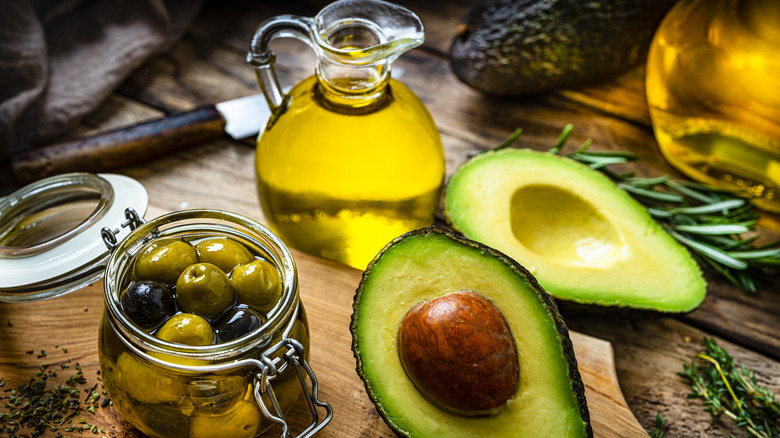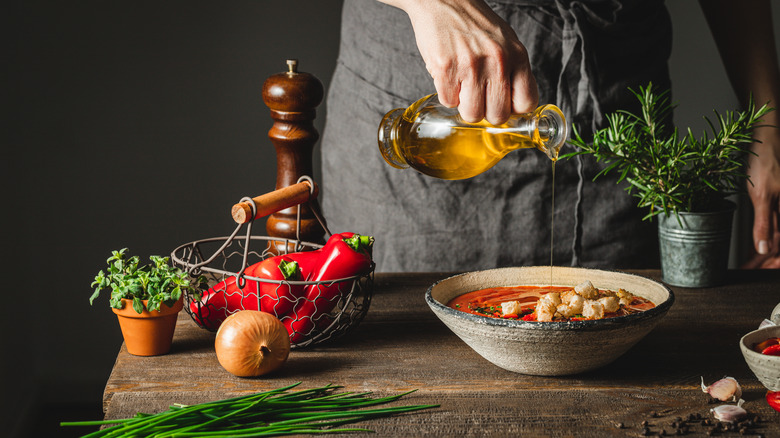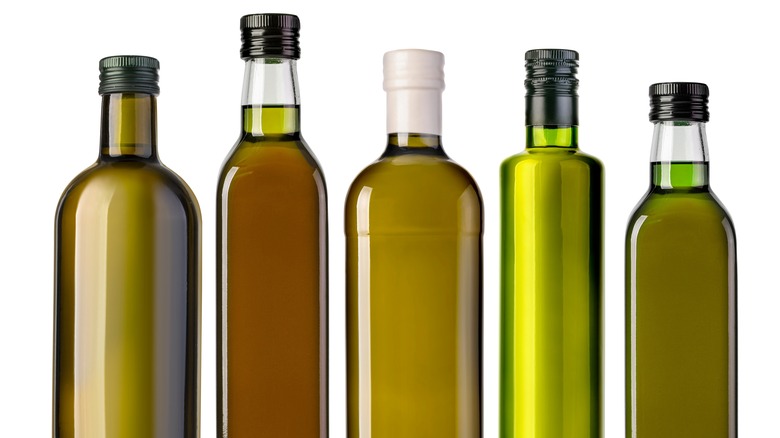Avocado Oil Vs Olive Oil: Is There A Nutritional Difference?
Cooking is both an art and a careful science. Between balancing the flavors of spices, aromatics, and sauces and achieving the perfect textures from juicy and succulent to firm and crunchy, crafting a beautiful and tasty dish is no easy feat. But it's not just flavors and textures that can make or break a recipe; it's also the nutritional content. When you eat food that makes you feel as good as it tastes, you can rest well knowing that your dietary choices facilitate a healthy and happy lifestyle in equal parts. But ensuring you're enjoying a nutritious meal starts at the very beginning with the cooking oil you're using. Two cooking oils that are generally touted as healthy are olive oil and avocado oil, but are there any nutritional differences worth considering?
To cut to the chase, both olive oil and avocado oil are nutritionally sound options to include in a healthy diet. Both oils are byproducts of nutrient-dense savory fruits: olives and avocados. Olive and avocado oil primarily consist of monounsaturated fats, particularly oleic acid, which can lower the risk of cardiovascular disease and cancer. Though olive oil has a bit more, both oils boast high levels of vitamin E, an antioxidant that promotes healthy skin and eyes. The monounsaturated fats in both oils facilitate the absorption of fat-soluble nutrients found in whole vegetables, making it easier for your body to turn those veggies into a vitality you can feel from the inside out.
How you use the oil makes a difference
On their own, olive oil and avocado oil are nutritious ingredients that can improve your overall well-being. While there are no significant differences in the nutritional makeup of the oils, how you use them and what you cook with them can impact the overall wellness of a dish. If you're dedicated to eating a nutritious diet, lean into pairing the oils with nutrient-dense foods you should eat every day.
Olive oil's robust flavor and moderate smoke point make it ideal for drizzling over salads or finishing dishes, while avocado oil's mild taste and high smoke point make it suitable for high-heat cooking methods like frying or grilling. Additionally, incorporating these oils into a balanced diet rich in fruits, vegetables, whole grains, and lean proteins can further enhance their nutritional benefits, contributing to improved overall well-being. Although they are fine in moderation, try to avoid frequently using olive or avocado oil to cook foods considered to be harmful to your health. These include foods with excessive amounts of sugar, salt, and saturated or trans fats, like cookies, cakes, and fries.
Selecting high-quality oils
It's important to select high-quality olive and avocado oil to get the most out of its flavor and nutritional benefits. When purchasing both, several key markers can guide your decision.
Consider the source of the oil: Look for oils from reputable producers and check labels for information on the origin of the oil and the specific varieties used. Certifications from reputable organizations such as the International Olive Council (IOC) for olive oil or the American Oil Chemists' Society (AOCS) for avocado oil can assure quality and authenticity.
Examine the color and clarity of the oil: High-quality olive oil should display a vibrant color ranging from golden yellow to green, while avocado oil may vary from pale yellow to deep green. Both oils should be clear without any cloudiness or sediment. Avoid buying oils packaged in clear bottles, and choose ones packaged in dark glass bottles that protect them from light, which can degrade the oil and reduce its shelf life.
Examine the aroma and flavor profile of the oils: Olive oil should have a fresh, fruity aroma with hints of grassiness or pepperiness. Avocado oil may offer a buttery, nutty aroma with subtle notes of mushrooms, reflecting the characteristics of the fruit.
Both olive oil and avocado oil have a place in a nutritional diet, and neither option is objectively better than the other. So be generous with your drizzles, and don't think twice about which option is more nutritious.


